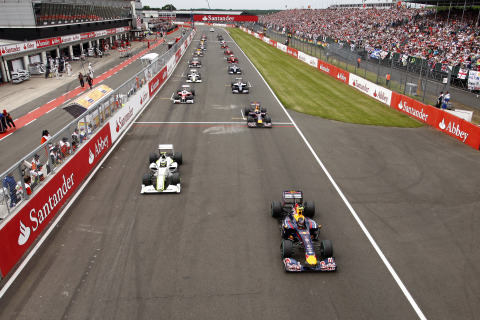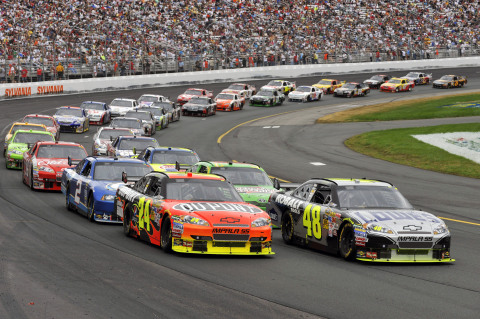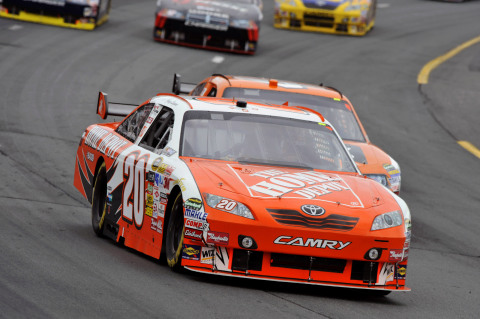The Way It Is/ As the world turns
by Gordon Kirby On Thursday of last week we were truly amazed--gobsmacked as the Brits say--to see FOTA and the FIA quickly agree to a deal to remove any threat of a breakaway F1 championship which apparently ensured that Max Mosley would be gone as FIA president at the end of his term in October. The FOTA guys stuck to their guns insisting that the key to any solution was Mosley's departure and there's no doubt that Bernie Ecclestone insisted in his own inimitable way when the time came in late night negotiations last Wednesday that Mosley must go.
On Thursday of last week we were truly amazed--gobsmacked as the Brits say--to see FOTA and the FIA quickly agree to a deal to remove any threat of a breakaway F1 championship which apparently ensured that Max Mosley would be gone as FIA president at the end of his term in October. The FOTA guys stuck to their guns insisting that the key to any solution was Mosley's departure and there's no doubt that Bernie Ecclestone insisted in his own inimitable way when the time came in late night negotiations last Wednesday that Mosley must go.
But on Friday and over the weekend Mosley threw cold water on everyone's excitement for a seemingly new age in F1. Mosley declared that FOTA and its president Luca di Montezemolo had violated the terms of their agreement with the FIA and deeply offended Mosley by suggesting that his days at the FIA's helm were over.
"They made the mistake of dancing on my grave before I was buried," Mosley told the UK's Mail on Sunday.
Mosley made fun of di Montezemolo's role at Fiat and generally said all he could to disparage Ferrari's boss. Mosley went on to say that there was now tremendous pressure on him from the FIA's membership to run for re-election in October. He said the FIA would not stand for the automobile industry attempting to determine F1's rules and regulations establishing a clear battle line in opposition to FOTA.

© LAT USA
In theory, three new Cosworth-powered teams--Campos Meta, Manor Grand Prix and Team USF1--will be added to the F1 grid making for as many as twenty-six cars. Part of the FIA/FOTA deal provides for the manufacturers teams to supply 'technical assistance' to the three new teams.
If the new teams are able to survive there will be plenty of cars next year. On the face of the FOTA/FIA agreement Ferrari, Mercedes-Benz, Renault, BMW and Toyota are as committed as ever to F1 and if Cosworth can return in a healthy and possibly profitable fashion, that too would be good for the sport.
Certainly this year's championship battle between Brawn GP's Jenson Button and Rubens Barrichello and Red Bull Racing's Sebastien Vettel and Mark Webber is one of the most refreshing anywhere in the racing world this year. Of course, it's old hands like Ross Brawn and Adrian Newey who are keys to the speed and success of Brawn GP and Red Bull, but there's nothing like new teams and fresh faces running at the front and winning races. This year's upending of the F1 applecart is great to see.
Equally, F1 has a fine new generation of young stars in Vettel, Lewis Hamilton, Robert Kubica, Nico Rosberg and Timo Glock who are suddenly making guys like Alonso, Raikkonen, Button, Massa and Webber look middle-aged.
It's also good to hear that one of FOTA's biggest wishes is for F1 to return to both the United States and Canada. So let's hope we see Montreal and le Circuit Gilles Villeneuve return as soon as possible to the world championship schedule and that Bernie Ecclestone makes a deal with Chris Pook this year to make Pook's hoped-for new California race come to life. Both those things would be great for the sport in North America and for F1 as a whole. But as long as Mosley is pulling strings in either the background or foreground F1's future is likely to remain unclear.

© LAT USA
In recent weeks Chevrolet officials have informed the company's four factory-supported teams competing in NASCAR's premier Sprint Cup series of the overall plans for cutbacks although no formal announcement has been made about these decisions. At this stage, other than a statement issued two weeks ago, General Motors officials refuse to discuss the company's role in NASCAR next year.
Four factory-supported Chevrolet teams compete in NASCAR's top series. Hendrick Motorsports fields four Chevrolets for defending champion Jimmie Johnson, four-time champion Jeff Gordon, Dale Earnhardt Jr., and Mark Martin; Stewart-Haas Racing runs two cars for two-time champion Tony Stewart and Ryan Newman; Richard Childress Racing's trio of Chevies are driven by Kevin Harvick, Jeff Burton and Casey Mears; and Earnhardt Ganassi Racing runs a pair of Chevys for Juan-Pablo Montoya and Martin Truex Jr.--eleven cars in all. It's believed that each of these teams have received annual financial support around $10 million per year with Hendrick Motorsport and Stewart-Haas at the upper end of the spectrum.
Both General Motors and Chrysler are using Chapter 11 bankruptcy laws and $62 billion in bail-out funds from the United States Treasury to restructure and reduce costs. GM is selling-off its most troubled brands and has closed 2,600 dealerships across the USA reducing its debt by $17 billion.
Jeff Gordon is the team leader of Rick Hendrick's four-car Chevrolet team and co-owner of Jimmie Johnson's car.
"I spoke to everybody at Hendrick about Chevrolet's cutbacks this week," Gordon said at last weekend's NASCAR race in New Hampshire. "We expected cutbacks to be made and the sooner we know about what's going to happen then the better we can react. They're having to react to what's going on with their company and as we learn what's going to happen we're going to react. We're still getting their support but it's changed and we're working through all that right now. How is it going to affect us? When we can announce that or talk more about it, we will."
Most NASCAR teams laid-off ten or twenty percent of their workforce last winter and more job cuts or salary reductions may take place.
"We had layoffs in the off-season and we're not treating it any different than any other business," Gordon said. "You know what your income is and you have your spread sheets and what it costs you. The first thing is you try to supplement that lost income somewhere else. Even in these tough times there are companies that have done well. So you look and search out there maybe down some different avenues for companies that are doing well to see if there's some interest there.
"Before I say what cutbacks there may be we want to be concrete about it. I don't want to speculate and just throw something out. The economy has affected all of us and we have to act accordingly, and that's what we're going to do."

© LAT USA
"Souvenir sales have been hurt dramatically by the economy," Gordon remarked. "The die-cast car model business is not what it used to be and that is an important business to the teams and even to the sponsors who used to look at it as a form of income that could offset some of their costs. So we've got to be more creative to find out how we can grow that business and get it back up to where it was in the late nineties and early 2000s."
Richard Petty Motorsports runs three Dodges this year for Kasey Kahne, Elliott Sadler and Reed Sorenson. 'The King' echoed Gordon's comments that the specifics of GM and Chrysler's NASCAR cutbacks remain unclear.
"We've seen Chrysler and GM go into bankruptcy and I see Lear Jet has also filed bankruptcy," Petty commented. "So it's still going on out there and we don't know what the impact is going to be. We don't know whether Obama wants to go into the racing business or not, so we've got to wait to see how all this settles down. I don't think as of today anybody knows what they're going to do next year. Everybody has got some plans laid-out but I don't think anybody has a concrete deal whether they're going to expand their team, cut back their team, or even what kind of car they're going to run."
Over the decades Petty's team has endured three separate manufacturer cutbacks or pullouts.
"We've been through all this stuff before two or three times at Petty Enterprises where the factories came in and we kind of really depended on them and then the factories went home and we survived," Petty remarked. "So whether the factories are involved or not in the near future, we're going to survive."
Petty pointed out that NASCAR's top teams have developed their own engineering programs and facilities.
"It used to be, and lately too, most everybody has depended on the factories for a lot of technical support," Petty said. "But over a period of time we've been able to get our own engineers and do our own wind tunnel programs and do the mechanical part of the engines and chassis. So we really don't look at the factories as strong as we did in the past.
"Today, the basic thing that the factories do is design the engines and build some of the engine parts that we so far have not developed in-house. So we're just going to have to play it by ear and continue to do what we're going to do. I think everybody is pretty well lined-up to finish this year with what they've got and sometime in the fall I guess everybody will figure-out what they're going to have at Daytona. So we'll just have to wait and see. I think everybody is up in the air in planning so far ahead right now."
NASCAR's vice president of competition Robin Pemberton also discussed the GM and Chrysler cutbacks.
"When people talk about the cutbacks," Pemberton observed, "the first thing you think about is the engineering help that goes into engines and chassis development, simulation work, wind tunnel time and all those things that help you compete. In today's world the industry has grown so that there are a lot of available rolling road wind tunnels in the United States and Europe and a lot of seven-post machines. There are a lot of nice engineering facilities around the country and those facilities will still be available for the teams to use whether they be the mega teams or the independent teams.
"With the manufacturers cutting back, hopefully they will continue to be involved in some way, shape or form. We've seen this flow from time-to-time over decades of racing. When things are good people spend more money and it's not just the manufacturers. It's all sponsorships and all the things that are required to run race teams and be competitive. Things go up and go down and we're hoping that with the cost-cutting measures we've done with the engines and reduced rpm in the Truck and Nationwide Series and limits on testing will lessen the immediate blow that will be delivered to some teams by the manufacturers pulling back.
"We'll take it step-by-step," Pemberton added. "We'll be here for the manufacturers when they decide to increase their support again and we surely support them. We're racing and car guys. We enjoy our involvement with the manufacturers and we feel like NASCAR is a good platform to advertise their product. Things go up and down over the years and we have to go with the flow."
Meanwhile, NASCAR has been pitching other foreign manufacturers to join Toyota in the Sprint Cup series. A few weeks ago NASCAR officials flew to Germany to meet with the Volkswagen Group which has been looking at competing in the IRL IndyCar series when its new formula begins in 2011. But NASCAR has stepped in to try to convince Volkswagen (which includes Audi and, of course, Porsche, too) that the Sprint Cup series would offer a much more powerful marketing platform. NASCAR chairman Brian France says NASCAR has been talking for years to many global auto manufacturers.
"NASCAR is the pre-eminent place in North America for car manufacturers to build their business through auto racing," France said. "We have our philosophical approach to welcoming new companies into our sport, as we did with Toyota. It is under a very clear set of circumstances that the manufacturers come to NASCAR to compete and that will not change."
Competition vice-president Pemberton expanded on France's comments.
"We would entertain other manufacturers that build cars in the United States," Pemberton said. "We're here and we have our rules package. People know what engines and cars they have to build when they come in. Toyota is a prime example of that. They've come in according to our rules and we feel good about our rules and regulations and what it takes to compete. We feel like with our tight rules everybody has an opportunity to come in and be fairly competitive very early on, maybe only a season or two at the most, and I think you can use Toyota as an example.
"It's a people sport and it depends a lot on who you surround yourself with--teams, engineers, drivers and personalities. We're always open to talk to people and manufacturers that are interested in coming in."
It looks likely therefore that Toyota represents only the leading edge of NASCAR's foreign invasion. Chevrolet's top teams are sure to continue to field the drivers and cars to beat for a few more years and Jack Roush's five-car Roush Fenway team continues to lead Ford's NASCAR attack. But Toyota's teams are getting better and GM and Chrysler's financial problems should result in more teams switching to Toyota. Nor may it be long before we see the likes of Volkswagen or one of its brands join Toyota in NASCAR's changing world.
Auto Racing ~ Gordon Kirby
Copyright 2009 ~ All Rights Reserved
Copyright 2009 ~ All Rights Reserved
Top of Page